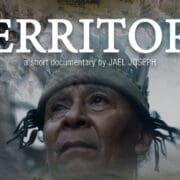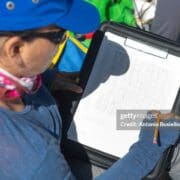Dominican Film On Indigenous People wins Best Documentary at Canadian Film Festival
News Americas, Toronto, Canada, Weds. Oct. 17, 2023: “Territory,” a short film focused on the indigenous people of the Eastern Caribbean island of Dominica- the Kalinago, recently won the Best Short Documentary at the 18th annual Caribbean Tales Film Festival (CTFF).
The film is the first submission by Director Jael Joseph to the festival, which took place in Toronto from September 6-22, 2023. “Territory” tied for the title with “Negra, Yo Soy Bella,” a film by Puerto Rico’s Vashi Korin.
“To win on my first try, it’s just an incredible feeling and I dedicate this win to my late parents and the Kalinago people of Dominica, who are still navigating how to best protect and retain their culture, traditions and identity and whose trust and openness allowed me to share their stories,” commented Joseph.
In her acceptance speech, she thanked family friends, colleagues and mentors singling out CTFF founder, Frances-Ann Solomon from whom she drew “inspiration and influence.”
CTFF celebrates the talents of established and emerging Caribbean and African filmmakers, presenting a multi-ethnic mix of exciting and dynamic films that showcase diverse and shared cultural stories. The 2023 submissions surrounded the theme Eco survivors bringing to focus the impact of climate change on Caribbean Small Island States (SIDS) and Canada.
Films selected into CTFF are reviewed by a programming committee – composed of film industry professionals- actors, producers, critics, tech), representing a mix of Caribbean islands, who determine winners in various categories.
For CTFF Festival Director, Diana Webley, “Territory” was awarded Best Short Documentary as it “provided a rare peek inside the Kalinago Territory in Dominica.”
“It is a film that reflects the current political situation and we wanted to shed light on it,” she said.
In “Territory,” Jospeph and her film crew, spent ten days following Anette Sanford, Samoza John and Natasha Green, descendants of the island’s first people, who gave their take on the individual and communal challenges they faced as residents of the 3,700 acre Kalinago Territory- an area on the island’s northeast that was ceded to the Kalinago 120 years ago. The film delves into the political struggles they face and focuses on the loss of their language and inability to use their land for economic development. The issues of the Kalinago were further juxtaposed against their recovery from Category 5 Hurricane Maria and the changes brought on by the COVID-19 pandemic.
The film also featured guest appearances by Kalinago Chief Lorenzo Sanford and Hon. Cozier Frederick, parliamentary representative for the area.
Joseph, a media entrepreneur and communications consultant, who splits her time between Dominica and Canada, is a Toronto Metropolitan University, (formerly Ryerson University) graduate, and was inspired to create this film alongside her research paper entitled, “Territory: Commonalities between the Reclamation of the Kalinago Language and Connection to Land.” For the paper she interviewed over 25 persons and developed some of the interviews into a 10-minute podcast called “Woryijan; Kalinago women and Intersectionality.”
While the award also signifies a personal achievement, Joseph sees its wider impact as a testament to the incredible power of storytelling.
Territory Director Jael Joseph poses with her award for Best Short Documentary.
“It’s my hope that territory continues to serve as a beacon of the storytelling tradition, shining a light on untold narratives and fostering understanding and unity in our diverse world,” said Joseph.
This experience has solidified her mission to champion the Kalinago people; and so far she has given support to events such as the Kalinago Spelling B competition through her brand Black Island Girl Multimedia, and has served as a vocal advocate for other initiatives within the community.
“I am really rooting for my Kalinago brothers and sisters,” says Joseph. “This documentary is just the start. I want to bring positive change to the community and commit to using my platforms to share their story and to impact their lives for the better.”
“Territory” was funded with support from an anonymous donor as well as the proceeds of prize won from The Creative School’s 2022 Johnny Lombardi Award for Creative Endowment. The film can be viewed online till September 22nd as part of CTFF, and will be screened at more film festivals worldwide.
The CTFF Award ceremony was held on Sunday 17th September 2023 at the Studio Theatre Harbourfront Centre, Toronto. The list of winners are:
Best Feature Documentary
“It is Not Past 08 12 1982”- Ida Does (Suriname)
Best Short Documentary (TIED)
“Territory”- Jael Joseph (Dominica)
“Negra, Yo Soy Bella- Vashni Korin (Puerto Rico)
Best Short Film
“Here Ends the World We’ve Known”- Anne-Sophie Nanki (Guadeloupe)
Best Comedy
“My Maxi”- Andrei J. Pierre (Trinidad & Tobago)
Best Animation
“It’s Nice in Here” Robert-Jonathan Koeyers (Curaçao / Amsterdam)
Caribbean Spirit Award
“Tabanca”- Lauren Marsden (Trinidad & Tobago / Canada)
Intersect Award
“My Lady of the Camelia”- Édouard Montoute (French Guiana)
Impact Award
“Powerlands”- Ivey-Camille Manybeads Tso (USA)
Innovation Award
“Yubism: Life and Art of Yubi Kirindongo”- Corry van Heijningen (Curaçao)
Best Cinematography
“Eden River”- Jack Evans (Belize)
Watch “Territory” HERE.



